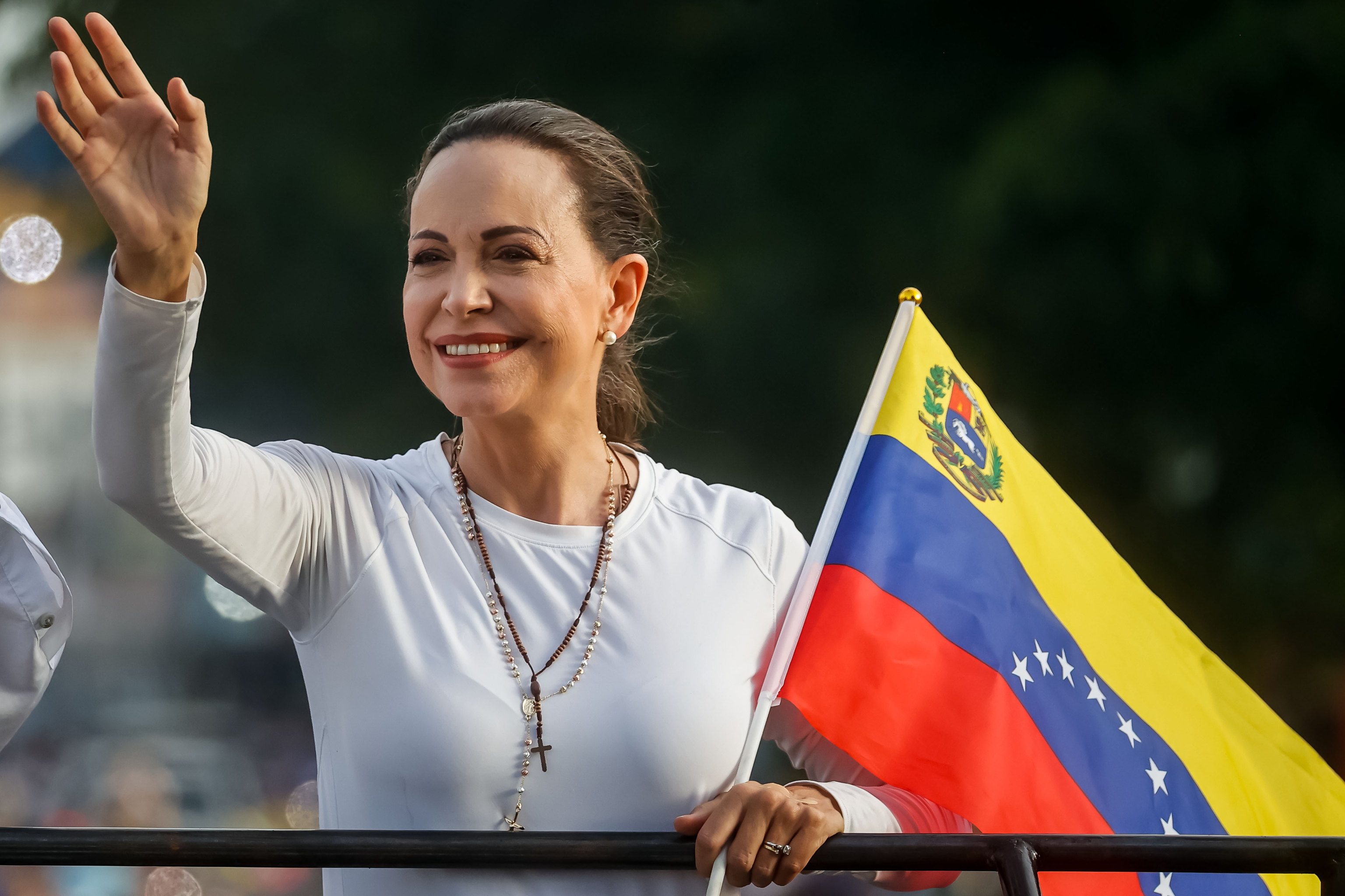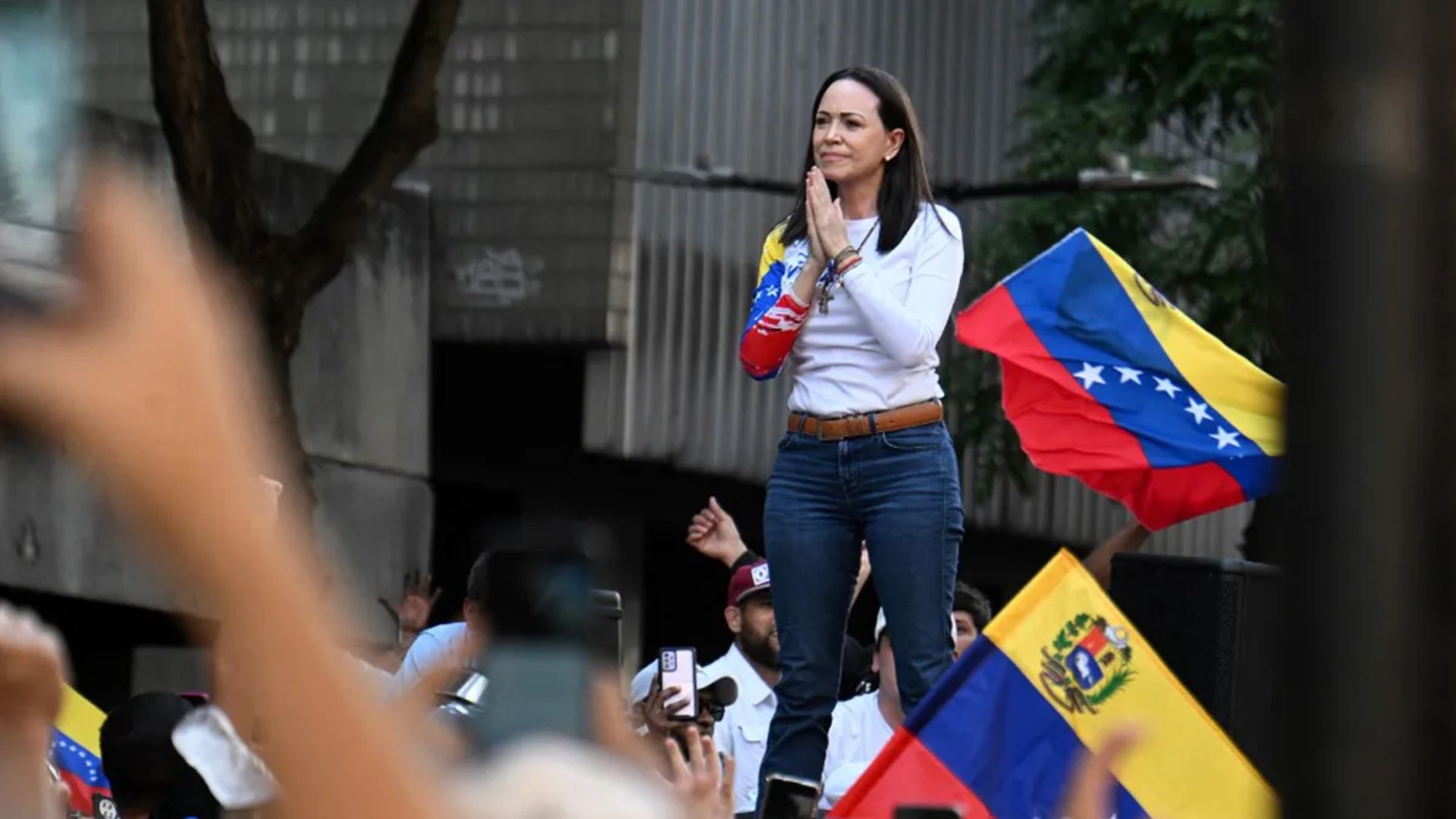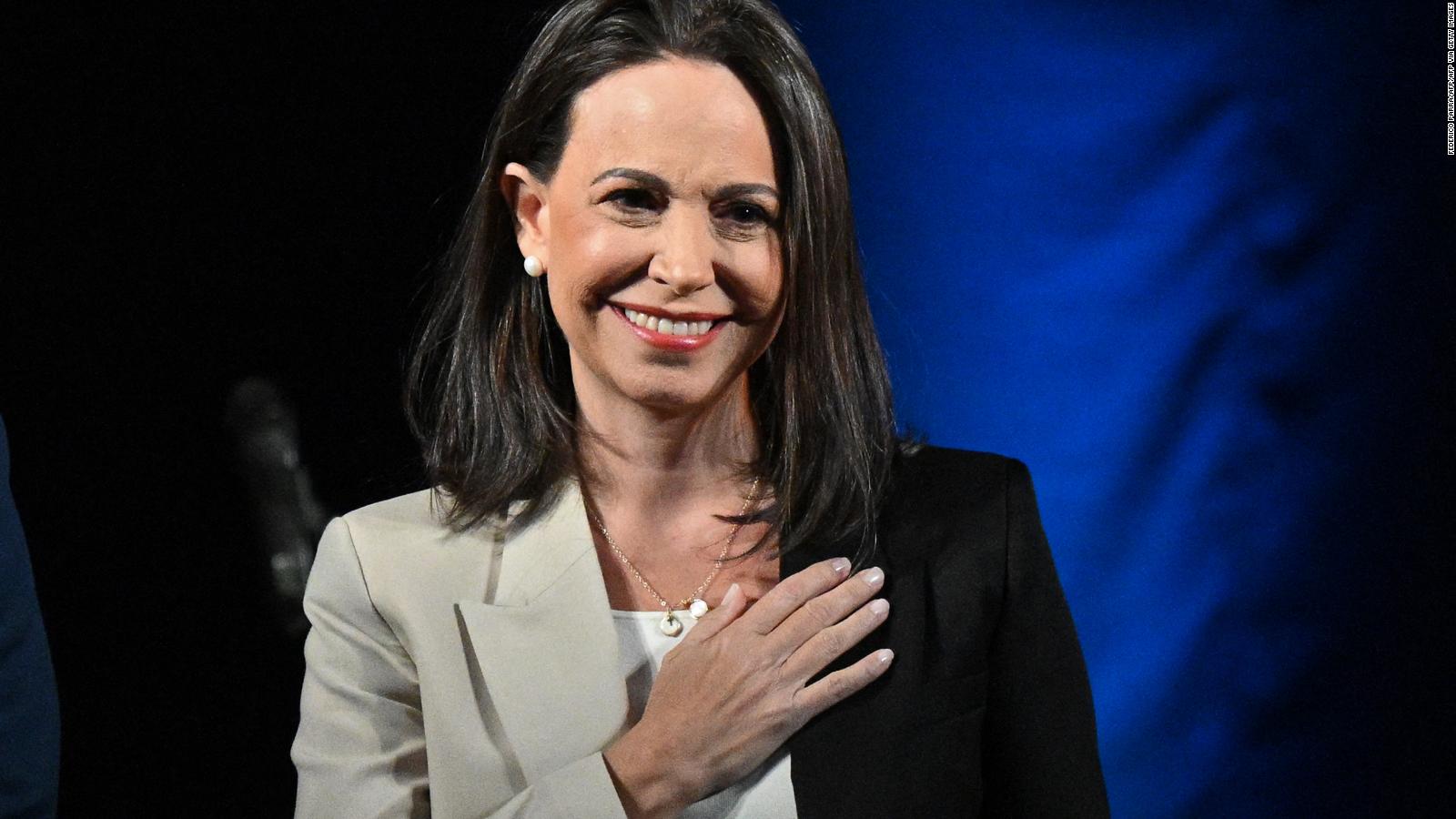María Corina Machado - A Look At Her Public Life
There's a lot of conversation, you know, surrounding María Corina Machado. She's, in a way, someone who has become a really prominent figure in Venezuela's political landscape. People are often talking about her background, her journey, and what she represents for many in the country. It's almost like her story is a very central part of current events there, drawing a lot of attention from various places.
Her path into public service, you see, has been quite a topic of discussion. From her early days, right through to her current position, she's been a consistent voice. Many are, in some respects, quite keen to understand the different turns her career has taken, and how she's come to hold such a visible role in the political discussions happening in Venezuela today. It's a narrative that, for many, sort of captures the spirit of the opposition.
So, we're going to take a closer look at some key aspects of her public life, drawing from available accounts. We'll explore her beginnings, her work, and some of the moments that have shaped her presence as a leader. It's, you know, a chance to get a better sense of the person behind the headlines and the various roles she has taken on over time.
Table of Contents
- Who is María Corina Machado - A Brief Life Story?
- María Corina Machado's Early Steps in Public Service
- How Has María Corina Machado Influenced Political Discourse?
- What Challenges Has María Corina Machado Faced as an Opposition Figure?
- Public Appearances and María Corina Machado's Connection with People
- María Corina Machado and the Military's Role
- María Corina Machado's Impact on the Opposition Movement
- A Recap of María Corina Machado's Public Journey
Who is María Corina Machado - A Brief Life Story?
So, when we talk about María Corina Machado Parisca, we're referring to someone who, you know, came into the world on October 7. There are actually two dates mentioned for her birth in different accounts: one says 1967, and another, in a Spanish text, says 1969. It's, you know, interesting how those details can sometimes vary a little bit. She's a Venezuelan politician, yes, but also, quite notably, an industrial engineer. And, in one description, she's also mentioned as a professor. So, you see, her background is quite varied, bringing together different fields of knowledge and experience. This blend of skills, arguably, gives her a very unique perspective on things, combining practical engineering thought with the more theoretical side of teaching, and then, of course, the public-facing role of politics. It's a rather interesting mix for someone in public life.
Personal Details and Bio Data of María Corina Machado
| Full Name | María Corina Machado Parisca |
| Date of Birth | October 7, 1967 (also cited as October 7, 1969) |
| Place of Birth | Caracas, Venezuela |
| Profession(s) | Politician, Industrial Engineer, Professor |
| Current Role | Opposition Leader in Venezuela |
| Political Movement | Founder and National Coordinator of Vente |
María Corina Machado's Early Steps in Public Service
Her formal involvement in public service, you know, really started to pick up speed in 2010. That's when she was, quite notably, chosen to be a part of the National Assembly. It was a significant moment, marking the beginning of her more direct participation in the country's legislative body. Before that, there were, in a way, other important points in her early years, suggesting a path that was gradually building towards this public role. She had, for instance, taken on the leadership of Súmate back in 2008. It was a role she held for a couple of years, apparently, before stepping down in 2010. This was done, quite simply, so she could pursue a position in the National Assembly, showing a clear ambition to serve in a more direct legislative capacity. So, her journey into the public eye was, in some respects, a deliberate and measured progression, with these early experiences shaping her future contributions.
How Has María Corina Machado Influenced Political Discourse?
When we look at how María Corina Machado has made her mark on political conversations, it's, you know, pretty clear that her way of thinking is very sharp. She has, apparently, a really keen mind that helps her articulate her viewpoints. Her manner of speaking, too, is quite direct; she doesn't, in a way, shy away from expressing her thoughts plainly. This sort of straightforward approach in her public statements is something that many people notice. She also holds a very firm stance against certain political figures, like Chávez. This opposition, you see, has been a consistent theme in her public life, defining a significant part of her political identity. She has, quite simply, been a longtime voice of criticism against the Venezuelan government, consistently challenging its policies and actions. This consistent stance, I mean, has played a big part in shaping the political discussions she engages in, making her a central figure in the opposition's dialogue.
She's also the person who, you know, started and now coordinates the national political movement called Vente. This group is, in some respects, a direct reflection of her political ideas and her vision for the country. It's like, she's not just talking about change; she's also built a platform for it. This movement, apparently, helps to organize and amplify the voices of those who share her perspective. It's a way, you know, for her to gather support and to work towards the goals she believes are important for Venezuela. So, her influence isn't just in her words, but also in the structures she's helped to create, which, you know, allows her to really shape the ongoing political conversation.
What Challenges Has María Corina Machado Faced as an Opposition Figure?
Being an opposition leader, particularly in a complex political setting, tends to bring its own set of difficulties. María Corina Machado has, in some respects, experienced a fair share of these. There was a time, for example, when her team said she was "intercepted" at a public gathering in Caracas. This happened, apparently, just before a big event involving President Nicolas Maduro. Afterward, she, you know, let it be known that she was safe, which must have been a relief for many. This incident, you see, highlights some of the pressures that can come with being a prominent voice against the current leadership. It's, like, a reminder of the various situations that can arise for those in her position.
There was also a specific instance, you know, when she was held. During this time, one of her assistants mentioned that she was, quite simply, "forced to record several videos." This account, I mean, gives a glimpse into the kinds of situations she has had to endure. It's a detail that, in a way, speaks to the challenges that can arise for someone who is so openly against the existing government. She was, for instance, held at a public march in Caracas on a Thursday. This particular event was, apparently, her first time appearing in public in quite a few months. She was there with a person who was, you know, described as her ally, someone who had been a former presidential. These moments, you know, really show the difficult circumstances she's had to navigate as a leading figure in the opposition.
Public Appearances and María Corina Machado's Connection with People
When María Corina Machado travels around the country, urging people to support a shift in the upcoming July 28, she's often met with, you know, a very strong emotional response. It's quite common for people to greet her with, apparently, laughter, and sometimes even tears. There are also, quite frequently, requests for help. This sort of reception, you see, really shows the deep connection she has with many of the people she meets. It's like, they're not just listening to a politician; they're sharing their feelings and their hopes with her. This genuine interaction, I mean, creates a very human picture of her public engagements. It's clear that her message, which is about encouraging voters to back change, resonates deeply with those she encounters. This direct connection with the public is, in some respects, a significant part of her influence and how she gathers support for her cause.
Her ability to draw out such feelings from people, you know, indicates that her message goes beyond just political talking points. It touches on, apparently, the everyday experiences and hopes of individuals. When she's out there, touring different places, she's not just giving speeches; she's, in a way, engaging with people on a very personal level. This sort of direct interaction, with all its emotional moments, tends to build a strong bond. It's almost like she becomes a focal point for their aspirations for something different. So, the laughter, the tears, and the pleas for assistance are, you know, all signs of the profound impact she has on the communities she visits, making her public appearances quite memorable for those who attend.
María Corina Machado and the Military's Role
María Corina Machado has, you know, also spoken directly to the military, urging them to really think about their historical importance in helping to bring back a democratic system. She, apparently, wants them to be fully aware of the significant part they could play in shaping the country's future. It's a rather direct appeal, asking them to consider their responsibilities beyond just following orders. She also, quite frankly, expressed her disapproval of their support for what she described as a "crumbling" system. This criticism, you see, is quite pointed, suggesting that she believes their current alignment is not serving the country well. It's like, she's calling on them to recognize the fragility of the existing structure and to consider a different path. Her words, I mean, are a clear attempt to influence a very powerful institution, highlighting her belief in their potential to help restore a more open and fair system of governance.
This particular stance, you know, shows a different aspect of her approach as an opposition figure. She's not just addressing the general public or other political figures; she's also, in a way, trying to persuade key institutions like the military. Her message to them is, apparently, about recognizing their place in history and making choices that align with the broader well-being of the nation. It's a bold move, you know, to openly question their support for the existing government and to suggest that they have a duty to help rebuild a more stable and representative system. So, her words to the military are, in some respects, a very strategic part of her overall effort to bring about significant change in the country.
María Corina Machado's Impact on the Opposition Movement
María Corina Machado has, in a way, become a very central figure in the opposition's efforts. She has, apparently, gathered a really big amount of public backing because of her firm stance against Nicolás Maduro. This widespread support, you know, is a clear sign that her message and her approach resonate with a lot of people who are looking for a different direction for Venezuela. It's almost like she's become a rallying point for those who oppose the current government. Her ability to attract such significant numbers of people to her cause shows, you see, her considerable influence within the broader movement. This kind of widespread acceptance is, in some respects, a testament to her consistent voice and her unwavering commitment to her beliefs.
She also, quite notably, performed very well in the opposition's primary election for president. She managed to get, apparently, more than 1.4, which, you know, indicates a very strong showing of support from voters. This outcome meant she, in a way, really stood out from the other candidates. It's like, she truly led the field, showing that she had a lot of momentum and popularity among those who participated. This strong performance in the primary election is, I mean, a clear indicator of her significant position within the opposition. It suggests that many people see her as a very viable choice to lead the effort for change. Her dominance in this process, you know, cemented her role as a key figure, someone with a clear mandate from a large segment of the opposition's base.
A Recap of María Corina Machado's Public Journey
So, we've looked at María Corina Machado's public life, from her beginnings as an industrial engineer and professor, to her becoming a significant opposition leader in Venezuela. We discussed her entry into the National Assembly in 2010 and her earlier role leading Súmate. We also touched on her very clear way of thinking and speaking, and her strong disagreement with Chávez's. The challenges she has faced, like being "intercepted" at protests and being forced to record videos during detention, were also mentioned. We explored how she connects with people during her tours, often being met with strong emotions and requests for help. Her calls for the military to consider their historical role in restoring democracy and her criticisms of the current system were also part of our discussion. Finally, we saw how she has gained a lot of support for her opposition to Nicolás Maduro and how she performed very well in the opposition's primary election.

María Corina Machado: Cada etapa de la lucha tiene su tiempo y es parte

VIDEO | María Corina Machado se dirige a la manifestación

Who is María Corina Machado and what does she propose as a pre